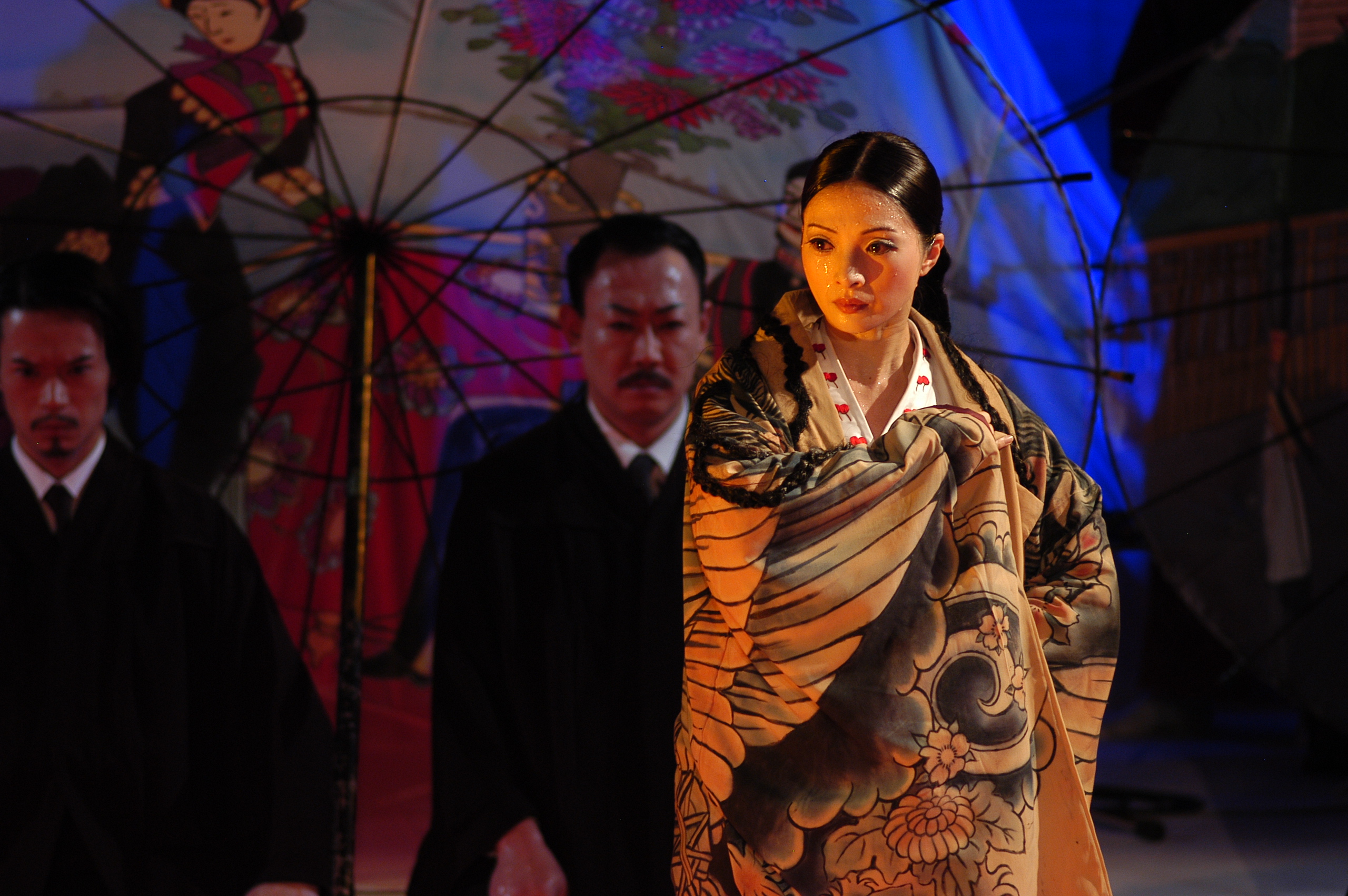Reimagining the classics is no easy task. Yet Satoshi Miyagi, famed Artistic Director of Japan’s SPAC (Shizuoka Performing Arts Center), manages to bring Euripides’ Medea to rousing new life by way of a directorial approach that unites form-breaking multi-sensory theatre techniques from the East with an impassioned feminist reading of the play.
Miyagi takes his audience back 125 years to the staunchly patriarchal Meiji era of Japan, a time of imperial expansion and political ambition. Here women’s bodies are regarded as territories to be exploited for gain, a point underscored by the opening of the play which unfolds in a bustling Japanese restaurant (brought to life evocatively by designer Junpei Kiz). Waitresses in blood-red kimonos proceed onto the stage like a regimented flock of birds, moving swiftly and silently. Although their heads are concealed by cloth sacks, the women hold monochrome pictures of their faces, inviting us to regard them as objects or symbols. A group of male judges enter, disturbing the stillness with abrasive chatter and jocularity. They decide to stage Medea for entertainment, so, in the manner of Shakespeare’s rude mechanicals, they assign themselves speaking roles and set about picking the waitresses they wish to physically embody the characters as if selecting dishes from a menu. It’s men, Miyagi emphasises, that are in charge of the narrative.
Bifurcating each character into male ‘speaker’ and female ‘mover’, as Miyagi elects to do, has a twofold effect. Not only does it draw attention to the way in which women are rendered mute by patriarchal narratives, but, more interestingly, it forces the male performers into a position of sympathy by getting them to voice Medea’s words. ‘We women are the most wretched of all God’s creatures,’ wails Medea (voiced by Kazunori Abe) in the style of a kabuki performer, infusing the part with romantic fury, devastation at betrayal, and flashes of irony. Korean actress Micari matches Abe’s superb delivery with a physical portrayal of Medea that oscillates between deferential wife and frenzied enchantress. She has a purposefulness to each of her movements and sometimes rebelliously uses gesture to contradict Abe’s vocals, underscoring the battle for power between the sexes that Miyagi puts at the centre of this production.
Scenes are brought to greater emotional power through extra-literary effects. Miyagi is a director that conceives of dance, mime, dialogue, lights, costumes and music like multifarious paints on a palette to be mingled in service of the complete image. At one point, Medea calls upon the goddess Hecate to conspire with her in vengeance – she plans to kill her only son to avenge Jason’s abandonment of her for King Creon’s daughter. Lights in the theatre dim in line with her darkening thoughts. A percussion band of women, screened off behind an oriental tapestry, adds to the sense of emotional turmoil as they perform a tune dominated by unruly drumbeats and frantic maracas. In response, Medea’s arms and legs fly as she realises her own powers of wild magic. For Miyagi, Medea’s subjugation is shown to be a result of an ‘otherness’ that is intersectional – she’s a witch, a foreigner, and a woman. He admirably foregrounds the complexity of her character and makes clear where our sympathies should lie, but perhaps compromises some of the play’s moral ambiguity.
Keeping in line with the spirit of experimentalism and deconstruction, Miyagi conjures up an alternative ending. The legendary chariot of Helios drawn by dragons in which Medea departs is done away with, and the play returns to its frame narrative to take a turn towards Senecan bloodbath. As if inspired by Medea’s actions, the waitresses at the restaurant reverse the power dynamics and kill the male judges they have been serving. It may seem like a gratuitous piece of spectacle or pure wish fulfilment, but it highlights the way in which fictional narratives powerfully influence action and prompt us to imagine the world differently.
What Miyagi presents in his Medea is an invigorating and utterly new way to tell an ancient story. The play-within-a-play has an alienating effect, reminding us at all times this is a performance, yet the audience is irresistibly implicated in the action through an assault of sensual effects. British directors should take note and turn to global performance art to inspire new ways of working.
The Coronet Theatre, Notting Hill
Medea
By Euripides
Director: Satoshi Miyagi
Photo credits: Takuma Uchida
Cast includes: Abe Kazunori; Micari; Ootaka Kouichi; Honda Maki; Kato Yukio; Yamamoto Miyuki; Yoshiue Soichiro; Tateno Momoyo; Sakakibaya Yuumi; Takii Miki.
Until: Saturday 21st June 2025
Running Time: 1 hours and 20 minutes with no interval
Review by Olivia Hurton
19th June 2025

